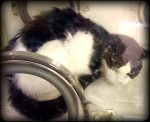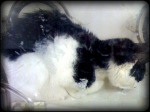How to Tell If Your Cat is in Pain
Cats Hide Their Pain Exceptionally Well
Holly, a seventeen-year-old domestic short-hair cat came to see me for weight loss and not wanting to eat for 3 days (we call this symptom anorexia in veterinary medicine, but I prefer the term inappetence, because it does not resemble the psychological and physical disease many people suffer by the same name.)
She gradually lost weight over the past 6 months. Holly was 11 pounds in June, and only 5 1/2 pounds when this picture was taken in the hospital.
Holly died the following afternoon.
I do not mean to be melodramatic, but to illustrate a point. This cat suffered from pancreatic cancer for 6 months, without her family realizing she was sick until it was too late to help her or to ease her pain. Many, many people can miss the signs of illness and pain in a cat, because cats hide their pain from us. (Look at the first picture above. Holly knew I was visiting her, so she “faked it.” Many studies have shown pets will do this to please us, and then quiver in misery after we leave the room, as proven by hidden camera technology.)
When Holly thought I wasn’t looking, without opening her baby incubator I had set her in for warmth and extra oxygen, I snapped the following pictures:
(In case you worry that I let Holly suffer in pain, rest assured she received strong opioid painkillers. Unfortunately, certain types of painful conditions, like pancreatic cancer, still cause pain unless the patient undergoes anesthesia. Sometimes a constant rate infusion CRI of painkillers works.)
5 Signs A Cat is in Pain:
- Behavior change. Noisy cat is quiet, quiet cat vocalizes.
- Hiding, withdrawn, reclusive.
- Sitting hunched with back arched, paws gathered under the body, nose resting on the floor, eyes closed.
- Purring does not mean a cat is happy! Some cats purr to comfort themselves when they hurt.
- Distant or faraway look to the eyes, like cat thinks about internal pain, instead of noticing the external environment.
5+ Signs a Cat Might be Sick:
1. Eating more or less. Or nothing. A fat cat can die if they refuse food for 3-4 days in a row (hepatic lipidosis.)
2. Vomiting.
Doc Truli summarizes recent thinking in feline internal medicine, “Vomiting hairballs is not normal for cats! Veterinarians used to believe hairball vomiting was a normal cat function; vomiting is abnormal. Something is wrong; see your vet!”
“Cats were desert animals thousands of years ago. They usually drink very little compared to dogs.”
4. Loosing weight for no reason. This can be difficult to appreciate when you see your cat every day.
Look for: bony hips, spine prominent, shoulders visible, ribs visible, temples atrophied and gaunt-looking.
“If your cat is not on a weight control diet, and his or her exercise has not increased significantly (like you moved to a gigantic house), then weight loss is a sign of illness.”
5. Diarrhea, Coughing, Sneezing, Yellow or green discharge coming out of anywhere on your cat.
6. Signs of pain like hiding, change in verbosity, change in voice, eye pain like blinking and tearing, and squinting…
Get Your Cat to the Veterinarian You Trust With Cats!
If you know your cat is ill, and the question is more about quality of life, see Doc Truli’s Pet Quality of Life discussion.
P.S. Added March, 2010, More How to Tell If Your Cat Is in Pain after an Auto Accident.






A painful reminder. My cat died of pancreatic cancer, and even the vets didn’t figure it out until he had a huge tumor. It was horrible.
I’ve been waffling on asking you about this, but having read this post, I’m asking for your help: A family member has a 13-year-old cat that doesn’t live with her due to another’s allergies. She went to visit her cat (and family) and discovered that she had lost two pounds! She looked scrawny and bad, and my friend was very upset. The person who cares for the cat loves her, but she doesn’t really understand pet care very well. She told her she had been eating a lot less lately. She normally gets kibble, so they bought wet food, and she ate quite a bit.
They took her to the vet, who ran blood work. I thought, based on what I’ve read on your blog and other lists I’m on, and the fact that she started eating again, that it might be pain from dental problems (and hopefully not diabetes or kidney stuff, etc.).
The upshot is that the vet said all her bloodwork is normal (though he did not give them a copy of it), and that “she doesn’t have any teeth”! When my friend asked what that meant, he said that she was missing half or more of her teeth, but the ones left look fine, and that therefore it can’t be her teeth. (Essentially, what can you do for teeth if there are none?) He said he has feline patients who have no teeth and can still eat kibble.
Although she is eating more now and has regained half a pound, there are still times she doesn’t act entirely herself, which seems like it’s connected to food/eating. I am concerned that this is not a good vet and that either the cat does have something dental wrong that requires dental x-rays, or that there is something else wrong that maybe can’t be gleaned from bloodwork.
What would you suggest? Does what this vet said make sense to you?
Dear Sharon,- It is normal for people to not notice gradual weight loss in a cat.
Most people miss the subtle signs. I secretly wonder if cats *glamour* their caretakers into not noticing. Let your family member know it’s okay to let the guilt go. Investigate the kitty’s weight-loss further. There is a reason! “Old age is not a disease.” And the foster family, I’m sure, will be more observant in the future!
Please excuse me for my delayed reply. I had to carefully think of how to answer your questions.
To the main question, basically, do I think that a cat that “…doesn’t have any teeth” cannot have oral or teeth problems leading to weight loss and inappetance, well, I think the opposite of that! The missing teeth show clear evidence of oral disease, perhaps feline resorptive lesions. I would investigate that mouth very carefully. If the cat can withstand anesthesia, a thorough oral exam and thorough high-quality oral radiographs will answer the question, “Is it her teeth?” It overwhelmingly, most likely is a dental health problem!
To the discussion of “blood work,” well, there are tests and then there are tests! Veterinary medicine, at this time, does not have an over-arching standard of care to guide veterinarians in recommending what blood work is reasonable for what age and infirmity of cat. With that said, I will share this:
VirtuaCat has had a CBC, Chem 25, Feline leukemia, feline aids, urinalysis, microalbuminuria, thyroid screening “T4” test and a urine culture an sensitivity done each year since he was 8 years old. I advise this panel for my feline patients 8 years and up. For cats 10 and up, valid research shows that 1 out of 5 has an asymptomatic, hidden urinary tract infection, hence the expensive, but helpful urine culture and sensitivity test.
[By the way, the blood must be obtained using good technique and good blood sample handling to give the most accurate results (highly trained, state certified veterinary technician, ideally), and the urine must be obtained by way of needle cystocentesis (a needle placed directly through the skin, thin body wall muscle and into the bladder) if the cat can safely be positioned for sampling. A urine culture and sensitivity test run on a “free catch” sample from the table, floor, or litter pan is useless. It will show bacteria not-native to the body, or no bacteria, even if there’s a problem, related to cleaning chemicals, etc, from the environs. Do not ever let a veterinarian submit a “free catch” urine sample for culture and sensitivity testing!]
Go ahead and request a copy of the test results. That’s a reasonable request. Also, if you wish, request a referral for a second opinion. A referral request is a reasonable and polite way to let the veterinarian know you want to dig deeper into the problem. You won’t burn any bridges, and can keep a good relationship with the veterinarian.
Lastly, I know your allergic family member is feeling horrified and guilty for having to leave the beloved kitty at a person’s house in which 2 pounds was lost and no one noticed!
Yours,
Doc Truli
hi, my cat has recently started being very jumpy and he is scared of things lying around on the floor like shoes, he has also ran into the sofa twice in the last week. do you have any ideas of what is up with him and wheather it is worth booking him into the vets?
thanks matt
Whoa! That’s really weird.
Dear Matt,
I’ve heard of the jumpy and scared thing before. Combined with the sofa running into thing, whoa.
List of Reasons a Cat Might Become Jumpy All of a Sudden
The jumpy thing has been *decreased or lost vision,
*fear reaction after a trauma (1 case was a car backfired right in front of the house when the cat was thinking about putting a paw up to move the curtain. The exact timing spooked him very badly for several months!),
*Extreme itchiness of internal discomfort coming out as decreased tolerance and jumpiness of things in the environment, especially plastic bags on the floor, and things like that,
*any illness that’s messing with his internal calm.
Matt: the Jumpiness Combined with the sofa running-into makes me concerned for his vision.
If I saw you and your kitty, we’d do a thorough physical, including blood pressure and eye and retinal examination,
baseline bloodwork,
including Complete blood count,
12-25 chemistry (depending on age, and physical exam),
urinalysis (with culture if he’s 10 or over),
thyroid screen if he is 3 or older,
parasite checks (can cause nervousness or unsettled feeling).
Feline leukemia/feline aids test is indicated if he hasn’t had a negative test in the past year.
Book an appointment with your fave vet. Notice his eating, urination, defecation, and grooming habits to help the vet narrow down the list of possibilities (and maybe narrow the test list.)
Think about activities at the house. Anything new, strange, people in or out, construction, work outside? Big storms? Is the jumpiness worse at night or in low lighting? Something you can figure out that might have directly triggered him in the day or days preceeding the weirdo behavior.
Oh! You wanted the “short” answer! 🙂 Yes! Call your vet for an appointment right away; time’s a-wastin’!